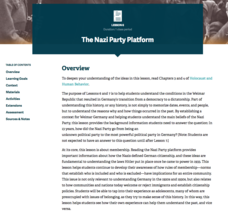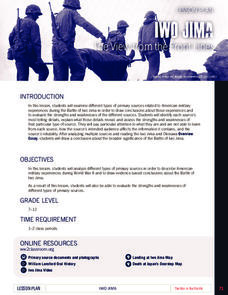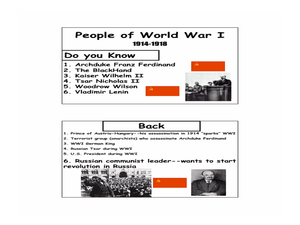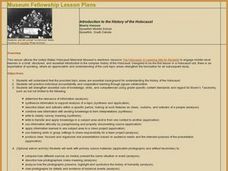Curated OER
What Did You Do After the War, Grandpa?
Students consider how World War II impacted Europe and European soldiers. For this Victory in Europe lesson, students visit selected websites to discover information about the war, its conditions, and the celebration that ensued at the...
Curated OER
Memories of War
Students consider how World War II impacted Europe. In this D-Day lesson plan, students visit selected websites to discover information about the invasion, its conditions, and the people who fought. Suggested activities are included for...
Curated OER
Supporting the Searchers: Seaplane Hangers at Norfolk Naval Air Station in World War II
Young scholars examine the reasons for the Allied victory during World War II. They discover the need for air and sea power and where bases are located. They answer questions and discuss answers to complete the lesson.
PBS
WWII: Detained
Imagine being forced against your will behind barbed wire for doing nothing but being yourself. Scholars investigate the impact Japanese-American internment camps had during World War II. Through video and archival evidence, they create...
Curated OER
World War II Notes
In this World War II study guide worksheet, learners read the notes provided regarding U.S. involvement in the war and add notes of their own.
Curated OER
Evaluate Causes of U.S. Involvement in World War II
Students examine and evaluate causes of U.S. involvement in World War II by interpreting a telegram from General Douglas MacArthur to William Allen White, the publisher and editor of Kansas' Emporia Gazette.
Curated OER
World War II: The Home Front
Students take a field trip to the MacArthur Memorial to learn what life was like in Norfolk during World War II.
National WWII Museum
What It Takes to Win: Mapping Primary Source Evidence
World War II was not just waged in Europe and Asia; the home front was key to Allied victory. Using newspaper clippings from World War II and a map, scholars plot out wartime production in the United States. After that, class members...
US Holocaust Museum
Remember the Children: Daniel’s Story
Imagine being a child forced from your home and into a concentration camp during World War II. Scholars prepare for a visit to the United States Holocaust Museum by researching the children of the horrible event. They analyze...
Facing History and Ourselves
Kristallnacht: Decision-Making in Times of Injustice
Have you ever been singled out in a crowd before? Pupils investigate and analyze the events of the Holocaust. They dive into the life of a middle school student, as well as the diary entries of those in Kristallnacht during World War II.
Facing History and Ourselves
The Nazi Party Platform
Not all party platforms stay democratic. A resource covers many political issues in Germany during the time of World War II, and teaches pupils about the Nazi party platform and what went wrong. Individuals participate in a warm-up...
National WWII Museum
Evaluating the US Decision to Drop the Atomic Bombs
While the use of the atomic bomb was the definitive end of World War II, the terrible weapons left new questions. Young scholars use primary sources and analytical worksheets to consider the implications of the fateful decision. Then,...
National WWII Museum
Iwo Jima: The View from the Front Lines
Iwo Jima was the site of some of the most grim fighting in World War II. Learners consider this fact while examining primary sources, including letters home, from those on the front lines. After they complete the analysis, scholars then...
National WWII Museum
On Leave in Paris: Maps as Primary Sources
Primary sources—even those that seem mundane—offer a window into those who experienced history. Using a Red Cross map offered to soldiers stationed in Paris after World War II alongside worksheet questions, scholars consider what life...
National WWII Museum
Rationing by the Numbers: Quantitative Data as Evidence
What was it like to live on wartime rations in the United States during World War II? Young historians find out by exploring how those on the home front bought food thanks to the ration system. Other data includes statistics on car sales...
US House of Representatives
From Exclusion to Inclusion, 1941–1992
The legacy of Japanese American internment impacted America for decades, including Congress. Class members consider the tenure of Asian American representatives in Congress and how the legacy of World War II affected their service. Other...
Curated OER
The Microwave and the Jiffy Store
Young historians examine the lifestyle changes and cultural changes that occurred as a result of the challenges posed by World War II on society in general. With regard to American History and culture, pupils write an essay on the...
National Math + Science Initative
Moon Watch: The Tides of War
What role did astronomy play in the liberation of France during World War II? Bring literacy and history into science with a cross-curricular lesson plan that examines the importance of weather stations and moon phases in the invasion of...
National Park Service
Remembering Pearl Harbor: The USS Arizona Memorial
Young historians use primary source materials to investigate the 1941 attack on Pearl Harbor and the sinking of the USS Arizona. After reading background articles and studying maps and images of the attack, class members consider whether...
Curated OER
Freedom by the Fireside: The Legacy of FDR's "Four Freedoms" Speech
Students read and analyze Franklin Delano Roosevelt's 1941 State of the Union Address. They listen to recordings of speeches by F.D.R., answer discussion questions, and participate in a debate.
Curated OER
Who Started World War I?
Young scholars debate which power was responsible for the outbreak of World War I. In this cause and effects lesson, students research the causes of the outbreak of World War I on ProQuest in preparation for a (limited) reenactment of...
Curated OER
People of World War I
In this people of World War I fact card worksheet, students use the notes and picture provided to create a note card for study purposes.
Curated OER
Survivor Stories
Trace a survivor's story using a timeline, map skills, poetry and/or prose and photography, and make a visual representation of a survivor's journey through his or her life as a culminating activity for the class and the survivor. This...
Curated OER
Introduction to the History of the Holocaust
The Holocaust is unbelievable! Examine this piece of history with your class. Using the Internet, research groups determine the relevance of information presented, compare how different sites present the same information, synthesize...
Other popular searches
- Causes World War Ii
- World War Ii Map
- World War Ii Holocaust
- World War Ii Battles
- Post World War Ii
- Propaganda World War Ii
- Causes of World War Ii
- World War Ii Newspaper
- World War Ii Veterans
- Allies in World War Ii
- World War Ii Geography
- Post World War Ii Asia

























